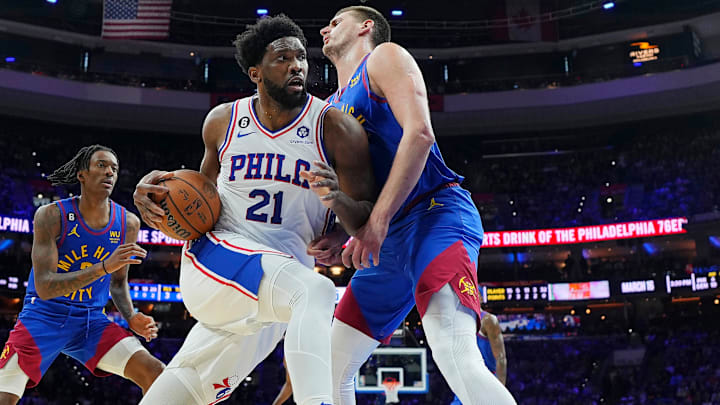The Philadelphia 76ers and Denver Nuggets showdown tonight will pit Nikola Jokic against Joel Embiid for the first time this season. The nationally televised heavyweight fight will be a head-to-head MVP debate to settle the dominant question of the past three seasons – Jokic or Embiid?
We’re in the era of Nikola Jokic and Joel Embiid
Over the past three seasons, the pair have finished first and second in the MVP voting and are once again making excellent cases to extend their duopoly over the league. What has made the unending MVP debate surrounding the two so fruitful is that while they share a position, they employ nearly polar opposite styles.
Joel Embiid is in line to win his third straight scoring title and is one of the league’s best rim protectors, while Jokic is an efficiency machine and the sport’s best passer but is merely an average defender. When Embiid dominates it’s easy to see. He’s scoring at will and disrupting shots. However, when Jokic is at his best, he’s setting up teammates, hitting floaters, and using positioning on defense to mask his poor rim protection.
Both styles are exceptionally effective, and there is a reason the two have entrenched themselves as the two best players in the world. But basketball isn’t about statistical accumulation. It’s about winning games, and this is where Jokic separates himself from Embiid.
How Jokic and Embiid perform based on game state
Game state matters in all sports. If you’re up by 20 points in the fourth quarter, does it really matter if you just scored your 44th point of the game? Conversely, if you’re down by two points with a minute left, a single-made shot dramatically improves your win probability. In both cases, a single shot was made, but one shot mattered, while the other was just fluff.
In basketball, great players aren’t just judged by their statistics. They’re judged by what they do when the game hangs in the balance, and it’s Jokic’s mastery of game states this season that separates him from Embiid.
This season, in games decided by 15 or more points in their favor, colloquially a blowout win, Embiid has been absolutely sensational, averaging 30:44 minutes, 36.1 points, 6.2 assists, and 12.4 rebounds per game on 57.7 percent shooting in nine games. In easy wins, games decided by between 14 and seven points, Embiid has also been excellent but sees his statistics drop just a tad. In t10 easy wins, Embiid is averaging 34:07 minutes, 35.4 points, 5.7 assists, and 11.7 rebounds per game on 53.2 percent shooting.
19 of Embiid’s 28 games played have been easy victories for the Sixers, and he has been a huge reason why, but in close games, he starts to wilt. In seven games decided by six points or fewer for either team, Embiid has averaged 37:51 minutes, 35.3 points, 6.1 assists, and 11.4 rebounds per game on 50.9 percent shooting. While Embiid’s raw counting stats don’t decline much depending on the game state, his efficiency and per-minute production does.
Jokic, on the other hand, sees his statistics, and in particular, his scoring, improve the closer a game gets. In blowout wins, Jokic averages 29:54 minutes, 21 points, 9.4 assists, and 12.4 rebounds per game on 68 percent shooting. In easy wins, he averages 33:24 minutes, 25.9 points, 10.3 assists, and 10.6 rebounds per game on 63.9 percent shooting. And in close games, he has averaged 35:10 minutes, 28.5 points, 9.7 assists, and 11.8 rebounds per game on 55.9 percent shooting.
How Nikola Jokic has mastered game states
The difference between Embiid and Jokic in close games becomes even more apparent when you look at the advanced metrics. Embiid has a 40.6 percent usage in blowouts and a 37.8 percent usage in easy wins and close games, while Jokic has a 25.2 percent usage in blowouts, a 26.4 percent usage in easy wins, and 30.2 percent usage in close games.
A similar trend emerges when you look at Box Plus-Minus (BPM). In blowouts, Embiid has a 16.4 BPM, but it declines to 13.1 in easy wins, and then 8.9 in close games. Those are all elite figures, but there is also a clear decline in performance. However, Jokic doesn’t see much of any decline when the game hangs in the balance. In blowouts, he has a BPM of 14.1, in easy wins, it’s 15.9, and in close games, it’s 15.7.
The difference between Jokic and Embiid this season has been how Jokic has augmented his game depending on the game state. When everything is clicking for the Nuggets, he’s excellent but doesn’t look to dominate the ball. However, as soon as the game begins to get close, he takes matters into his own hands and becomes a high-usage monster. Embiid, for as exceptional as he is, doesn’t alter his game depending on the game state. He’s a high-usage shot monster whether the Sixers are down two or up 20.
Due to Embiid already missing 10 games, we might not get another Jokic vs. Embiid MVP showdown, but that doesn’t change the best player in the world debate. Embiid is a phenomenal player having a monstrous season, and the only nit to pick, outside of availability, has been his decline in performance from god-like in blowouts to merely exceptional in close games.
The difference between the two is that when the game hangs in the balance, the better player has been Jokic. His ability to ramp up his usage in critical stretches is the Nuggets’ secret weapon, and it is another example of his Nikola Tesla-level basketball IQ. Basketball is about winning, and no player in the league today is better at rising to that challenge than Nikola Jokic.
